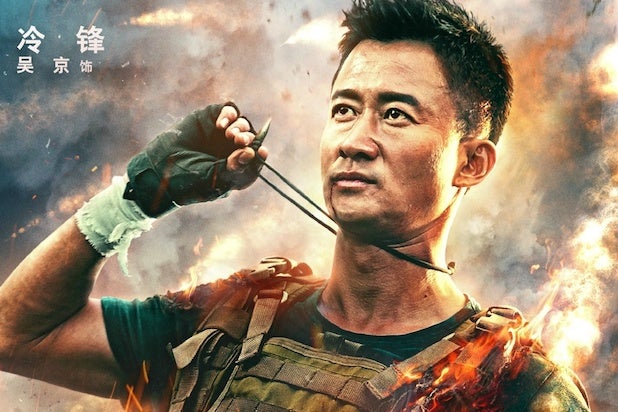Hollywood's China Money Heartbreak: Is the Love Affair Really Over?
5:00 AM PDT 8/10/2017 by Scott Roxborough , Patrick Brzeski

Zhang Peng/LightRocket (Money), Bill O'Leary/The Washington Post (Trump), Krisztian Bocsi/Bloomberg (Xi), Chip Somodevilla (Scaramucci), Win McNamee (Schumer), Han Haidan/CNSPHOTO/VCG (Wang), all Getty Images
Billions have been thrown into turmoil as Chinese regulators crack down on investments, Paramount’s backer skips a payment and both Trump and some Dems adopt a protectionist stance.
For nearly five years, Hollywood has been buoyed by a flood of cash from China in the form of both surging box-office revenue and multibillion-dollar investments in studio slates and independent film companies.
The most high-profile pacts have involved some of the biggest brands in both China and Hollywood, such as real estate behemoth Dalian Wanda, which bought Legendary Entertainment for $3.5 billion in 2016 and owns leading U.S. cinema exhibitor AMC Entertainment; internet giant Alibaba, which in October took an equity stake in Steven Spielberg’s shingle Amblin; China Media Capital, which owns part of Brian Grazer and Ron Howard’s Imagine Entertainment; and Fosun, financiers of Jeff Robinov’s Studio 8.
With a largely stagnant domestic movie business — so far this year, box-office receipts in North America are down 3 percent — the film studios have come to rely on Chinese capital to get their movies made and keep profits climbing.
But economic and political shifts coming from both Washington and Beijing are threatening to create a perfect storm of regulatory upheaval that could sink, or at least beach, future U.S.-China media deals.
“Hollywood should be worried because now we are seeing pressure [to crack down on deals] from both ends,” says Stanley Rosen, a professor of political science at USC who studies China’s film industry. “Access to the Chinese market will continue, but investment from China in the U.S. entertainment industry will be toned down considerably.”
Already there are signs of disruption in the Sino-Hollywood love affair. Several big deals that were in the works — Wanda’s $1 billion takeover of Dick Clark Productions, the $345 million acquisition of Voltage Pictures by Chinese mining group Anhui Xinke and a $416 million investment by China’s HNA Group in U.S. in-flight entertainment provider Golden Eagle — have failed, with sources citing a regulatory crackdown in China as a major reason for their demise.
Another high-profile deal involving HNA — the company’s planned $200 million acquisition of Skybridge Capital, an investment group controlled by former White House director of communications Anthony Scaramucci — also could face renewed scrutiny in what would be yet another blow for “The Mooch,” whom President Trump fired just 10 days into the job.
The protectionist tendencies of Trump, who made China-bashing a pillar of his election campaign, have found rare bipartisan support from Capitol Hill, with several lawmakers pushing for increased regulatory scrutiny of Sino-Hollywood deals. On Aug. 1, Sen. Chuck Schumer, the ranking Democrat in the Senate, went a step further, calling on Trump to block all major Chinese investment in the U.S. as a means of pressuring Beijing to do more to deter North Korea’s nuclear missile program.
Meanwhile, Beijing officials have tightened restrictions on outside investment by mainland firms, worried that too many companies are using U.S. media acquisitions as a means of funneling money offshore. On Aug. 3, Viacom disclosed that it did not receive its expected June payment from Huahua Media, the Chinese group that has a three-year, $1 billion deal to fund 25 percent or more of Paramount’s film slate. Paramount has been counting on that cash to help it bounce back from years of financial losses.
Then there’s the case of Dalian Wanda, which in July saw its standing as perhaps China’s most aggressive acquirer of Hollywood assets — including Legendary and AMC — plummet after the company and its brash chairman, Wang Jianlin, became the target of a crackdown on debt that resulted in the $9.3 billion sale of the bulk of its theme park and hotel interests. The company now reportedly is barred from receiving loans from the country’s biggest banks, leading some to question the long-term financial health of the U.S. companies in its stable.
Legendary insists it is “business as usual,” but the studio has significant overhead (with about 300 employees) and doesn’t have a new film hitting theaters until the spring, when it rolls out Pacific Rim: Uprising, the sequel to the 2013 actioner that grossed $411 million worldwide. Legendary’s recent run has been mixed, with the flop of The Great Wall set against the global success of Kong: Skull Island. In 2015, the last year for which figures are available, Legendary lost $560 million.
There have been some encouraging signs that business still is being done, such as the Aug. 7 announcement that Tang Media Partners, which has several Chinese backers, finalized the acquisition of troubled Spotlight studio Open Road Films. While incoming CEO Rob Friedman says the deal is secure from Chinese regulators ("I have no concerns about that whatsoever," he tells THR), truly big deals of the Wanda-Legendary or Alibaba-Amblin variety look scarce.
All eyes now are on Paramount’s financing agreement with Huahua, the last big studio slate deal signed after China began its crackdown. The deal has been a money loser for Huahua so far, with disappointing box-office performances for Paramount’s recent titles, including Transformers: The Last Knight, which underperformed in the Middle Kingdom, earning about $230 million compared with $320 million in China for Transformers: Age of Extinction.
Christopher Spicer, an attorney at Akin Gump who has packaged several China pacts, says studio slate deals are unlikely to be impacted by the current crackdown. Instead, he sees problems for U.S. film companies looking for Chinese corporate equity. Deals like the one China Media Capital inked with Imagine Entertainment or Fosun with Studio 8 — a Chinese company spending big to acquire a piece of a Hollywood production house — might become a thing of the past.
“I don’t think the dream’s over … but companies selling for crazy [money] to Chinese companies, those deals are over,” says Spicer, who believes several China-Hollywood deals in the works still could go through, provided the Chinese firms in question have “enough money parked offshore” to bypass government restrictions on exporting capital.
Lindsay Conner, a partner in charge of entertainment and media at the L.A. office of Manatt, cautions that large investments in Hollywood by Chinese companies outside the entertainment field — Voltage suitor Anhui Xinke is a mining company, and HNA Group runs a Chinese airline — could be over. “The Chinese government will continue to be skeptical of non-entertainment companies in China throwing money into entertainment investments,” he says. “They are concerned that it is motivated in part by a desire to get money out of China.”
Conner, however, believes Beijing will continue to support established entertainment companies with global expansion plans. He expects deal making to pick up again by the end of the year, particularly after the ruling Communist Party holds its national congress in the Fall.
“It's no longer a gold rush but (China) has shown they are still willing to let mature Chinese entertainment companies make thoughtful investments in Hollywood,” he says. “I believe that after a relatively brief period of lesser activity we will see a renewed level of activity."
Others see the political saber rattling between Washington and Beijing as a sign that things likely are to get worse — maybe much worse. In his letter to the president, Sen. Schumer said Trump should use his authority over the Committee on Foreign Investment in the U.S. to hit Beijing with a suspension on “all mergers and acquisitions in the U.S. by Chinese entities.”
If Trump wants to crack down on China, he has a number of options, including enacting Section 301 of the 1974 Trade Act which allows the Commander and Chief to take unilateral punitive measures, including fines and tariffs, against countries deemed guilty of “unfair” trading practices. Even the mere talk of such a move, insiders say, could pressure regulators to more closely scrutinize future deals and cast a pall over the Sino-Hollywood relationship.
“Already you are seeing a more cautious approach on the part of regulators who are worried about potential political blowback if they approve a deal,” says DJ Rosenthal, a Washington-based analyst with corporate investigations and risk consulting firm Kroll.
If Trump does take the nuclear option and reactivates Section 301, it could spell disaster for U.S.-Chinese business, not least because Beijing is likely to play tit for tat, imposing fines or restrictions of its own on U.S. companies.
“They have a huge range of options,” notes Rosen. “They can slap a billion dollar fine on American companies working in China, they can add new regulations or restrictions to anyone doing business there. We are in a very bad position to try and influence the Chinese on this issue. They have a long-term plan and speak with one voice. We have no clear policy and an administration that says different, and contradictory, things one day to the next.”
A version of this story first appeared in the Aug. 9 issue of The Hollywood Reporter magazine.





 Reply With Quote
Reply With Quote



















